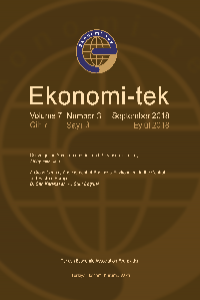Maliye Politikasında Manevra Alanı Var Mı?
Bu çalışmanın iki temel amacı bulunmaktadır. Birincisi, Türkiye’deki mevcut koşullar altında, maliye politikasında ne ölçüde manevra alanımız olduğunu belirlemektir. İkincisi hesapladığımız manevra alanının olası bir kötü senaryo altında ihtiyacımızı karşılamaya yetip yetmeyeceğini değerlendirmektir. Bu çerçevede, borç sınırı, manevra alanı, genişlemeci maliye politikası borç sınırı ve gerçek manevra alanı gibi kavramlar tanımlanmaktadır. Bazı alternatif senaryolar için mevcut koşullar altında Türkiye için bu büyüklükler hesaplanmaktadır.
Anahtar Kelimeler:
Borç sınırı, genişlemeci maliye politikası borç sınırı, manevra alanı, gerçek manevra alanı
Does fiscal space exist?
The first aim of this study is to calculate the fiscal space in Turkey under the current economic conditions. The second aim is to evaluate whether this fiscal space is sufficient for fiscal policy response if Turkish economy faces a negative shock. In this framework, concepts such as debt limit, fiscal space, fiscal stimulus debt limit, and real fiscal space are defined. Furthermore, such measures are calculated for alternative scenarios.
Keywords:
Debt limit, fiscal stimulus debt limit, fiscal space, real fiscal space,
___
- Burnside, C., M. Eichenbaum ve S. T. Rebelo (2001), “Prospective Deficits, and the Asian Currency Crisis,” Journal of Political Economy, 109(6), 1155-1197.
- Çufadar, A. ve F. Özatay (2017), “Sovereign Risk, Public Debt, Dollarization, and the Output Effects of Fiscal Austerity,” Journal of International Money and Finance, 72(April), 75-92.
- Frankel, J. A., C. A. Vegh ve G. Vuletin (2013), “On Graduation from Fiscal Procyclicality,” Journal of Development Economics, 100(1), 32-47.
- Ghosh, R. A., J. I. Kim, E. G. Mendoza, J. D. Ostry ve M. S. Qureshi (2013), “Fiscal Fatigue, Fiscal Space and Debt Sustainability in Advanced Economies,” The Economic Journal, 123(February), F4-F30.
- Mendoza, E. G. ve J. D. Ostry (2008), “International Evidence of Fiscal Solvency: Is Fiscal Policy Responsible?” Journal of Monetary Economics, 55(6), 1081-1093.
- Özatay, F. ve G. Sak (2002), “Banking Sector Fragility and Turkey’s 2000-01 Financial Crisis,” Brookings Trade Forum, 121-172.
- Özatay, F. (2016), “The Policy Response in Emerging Market Economies in the G-20,” Tamim Bayoumi, Stephen Pickford, Paolo Subacchi, der. içinde, Managing Complexity: Economic Policy Cooperation After the Crisis, Washington, D.C., Brookings, 207-237.
- Özatay, F. (2019), “Mind the Gap: Debt Limit and Fiscal Stimulus Debt Limit, TEPAV Working Paper No: 201901.
- ISSN: 2146-6173
- Yayın Aralığı: Yılda 3 Sayı
- Başlangıç: 2012
- Yayıncı: Türkiye Ekonomi Kurumu Vakfı
